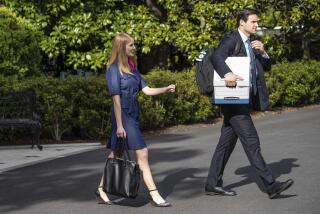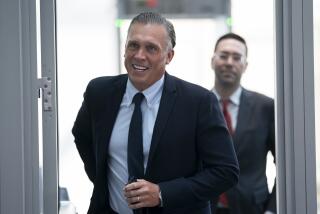Seymour Says Deaver Lied to Save Firm
- Share via
WASHINGTON — Michael K. Deaver, his perjury trial scheduled to begin Monday, lied to shield himself from ethics charges, protect his lucrative business and hide its true function--capitalizing on connections to the White House, an independent counsel said Thursday.
Whitney North Seymour Jr., who was appointed to investigate whether the former White House aide had violated the Ethics in Government Act with his lobbying activities, made the charges in an unusual pretrial memorandum on the evidence he plans to introduce at Deaver’s trial.
Faces Up to 25 Years
Deaver, the first person charged under the ethics law but only on related perjury counts, has pleaded not guilty to five counts of lying to a federal grand jury and a House subcommittee about his lobbying since he left the White House. If convicted, he faces up to 25 years in prison and a $34,000 fine.
“It is our intention to prove that Deaver had three distinct but interrelated reasons to give willful false testimony,” Seymour told U.S. District Judge Thomas Jackson, who will oversee the trial.
Deaver’s attorney, Randall Turk, declined to comment on the accusations but said he may file a response in court next week.
Money Considerations
Seymour, providing a rare glimpse at his prosecutorial strategy, pointed to money considerations as one of Deaver’s motivating factors for lying to the grand jury and congressional panel. He cited the pending sale last year of Deaver’s company, Michael K. Deaver & Associates, for up to $18 million, and the upcoming renewals of lucrative contracts with Philip Morris, Canada and TWA that Seymour said “yielded millions of dollars of income for relatively little work.”
“The cases are legion where evidence of economic interest was admitted to prove motive to commit crime,” Seymour told the judge. “The government should be permitted to introduce evidence of Deaver’s motives to lie, and to make the arguments that follow logically from that evidence.”
‘Potential Violations’
Deaver “knew that truthful testimony would reveal not only potential violations of the Ethics in Government Act (some of which related to areas not yet explored by those investigating him),” Seymour wrote, but the former White House deputy chief of staff knew “that truthful testimony would end all chances” for the lucrative sale of his business.
“Money considerations, too, played a part,” he said.
The prosecutor also charged: “Defendant knew that truthful testimony would reveal the true nature of Deaver’s lobbying business, showing that defendant traded on his personal relationships with high government officials and collected large fees.”
More to Read
Inside the business of entertainment
The Wide Shot brings you news, analysis and insights on everything from streaming wars to production — and what it all means for the future.
You may occasionally receive promotional content from the Los Angeles Times.










